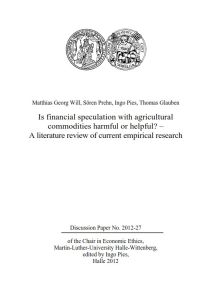Melden Sie sich bei getAbstract an, um die Zusammenfassung zu erhalten.

Melden Sie sich bei getAbstract an, um die Zusammenfassung zu erhalten.
Matthias Georg Will, Sören Prehn, Ingo Pies and Thomas Glauben
Is Financial Speculation with Agricultural Commodities Harmful or Helpful?
A Literature Review of Current Empirical Research
Uni Halle-Wittenberg, 2012
Was ist drin?
Find out what research reveals about speculation in agricultural markets.
Recommendation
Is speculation in agricultural commodities bad for society? Matthias Georg Will and Ingo Pies from Martin-Luther-University Halle-Wittenberg, and Sören Prehn and Thomas Glauben from the Leibniz Institute for Agricultural Development in Central and Eastern Europe illuminate this general question as they examine a more specific one: What, if any, impact does financial speculation have on agricultural markets? The scholars review current empirical research to cut through stormy controversies about speculation, regulation and food shortages. Their article epitomizes academic writing: On the downside, the authors use repetitive, often stilted language and neglect to define arcane terms and concepts. On the upside, the researchers are thorough and focused, a necessary approach when dealing with a topic that can engender passionate opinions that both agree and disagree with this review’s conclusions. The researchers see no connection between commodities trading and food shortages, but they acknowledge the need for further assessments. While always politically neutral, getAbstract recommends this article to those interested in the economic and social impact of commodities trading and speculation on the world’s food supply.
Summary
About the Authors
Matthias Georg Will and Ingo Pies serve on the economics faculty at Martin-Luther-University Halle-Wittenberg. Sören Prehn and Thomas Glauben are researchers at the Leibniz Institute for Agricultural Development in Central and Eastern Europe.




















Comment on this summary